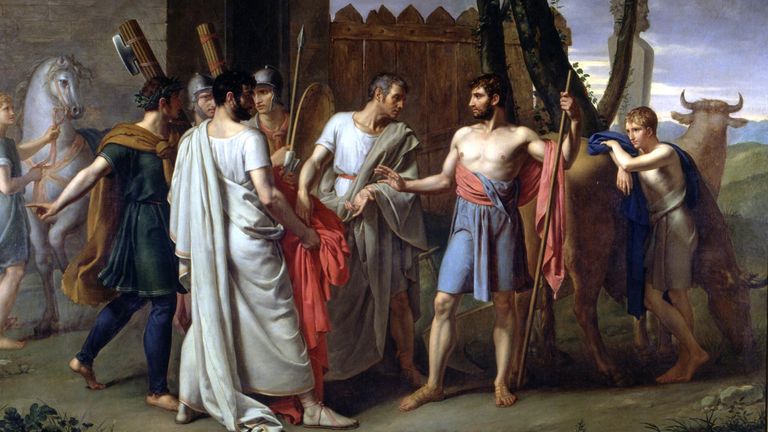Who was Cincinnatus and why did Johnson reference him in farewell speech?
Boris Johnson has fuelled speculation about a possible return to frontline politics by referencing a Roman statesman in his farewell address.

Boris Johnson has fuelled speculation about a possible return to frontline politics by referencing a Roman statesman in his farewell address.
Promising his “most fervent support” to his successor Liz Truss, Mr Johnson compared himself to Cincinnatus, who was made dictator in 458 BC to lead the battle against an invasion before returning to his farm.
In doing so he became famous for resisting the temptation to hang on to power or meddle in politics.
According to tradition, however, Lucius Quinctius Cincinnatus later returned to serve a second term.
Truss and Johnson flying to see Queen – follow latest updates
“On the subject of bouncing around in future careers, let me say that I am now like one of those booster rockets that has fulfilled its function,” Mr Johnson told a packed Downing Street.
“I will now be gently re-entering the atmosphere and splashing down invisibly in some remote and obscure corner of the Pacific.
“Like Cincinnatus, I am returning to my plough and I will be offering this government nothing but the most fervent support.”
As a classics scholar Mr Johnson will be aware how much people will read into his remarks.
‘Enemy of the people’
Mary Beard, the famed classicist, tweeted: “If you are curious about Boris Johnson’s reference to Cincinnatus in his goodbye speech – he was a 5th century BC Roman politician who saved the state from an invasion, then – job done – returned to his farm (‘to his plough’).
“He was also an enemy of the people.”
That refers to his resistance to allowing Rome’s commoners – plebeians – to have a written constitution that would check the power of the patrician class.
The satirist Armando Iannucci, who created political sitcom The Thick of It, said: “Johnson expects to be called back.
“Cincinnatus was recalled from his plough to become leader of Rome a second time. Someone tell the people with microphones at Downing Street.”
Mr Johnson has previous form in mentioning the Roman senator. In an interview in 2009 he said: “In the immortal words of Michael Heseltine, I cannot foresee the circumstances in which I would be called upon to serve [as prime minister].
“If, like Cincinnatus, I were to be called from my plough, then obviously it would be wrong of me not to help out.”
According to the Encyclopaedia Britannica entry on Cincinnatus: “At the time of his appointment he was working a small farm. He is said to have defeated the enemy in a single day and celebrated a triumph in Rome.
“Cincinnatus maintained his authority only long enough to bring Rome through the emergency. He then resigned and returned to his farm.
“Most scholars see no factual truth in the further tradition that Cincinnatus was given a second dictatorship in 439 to check the monarchical ambitions of Spurius Maelius. Once again, he is supposed to have ceded his power after ending the crisis.”
It remains to be seen whether Mr Johnson’s reference is a hint at his plans to return to the top job.
There has been speculation he will plot a Trump-style comeback from the backbenches.
